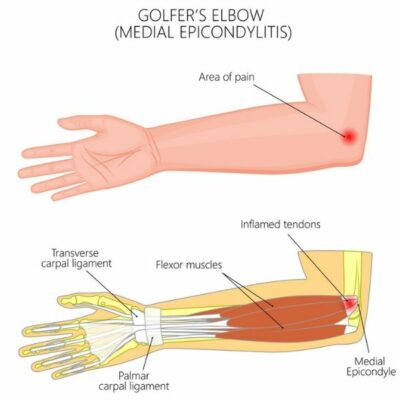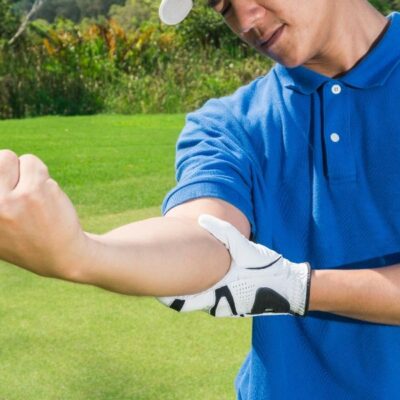Golfer’s Elbow Specialist

Are you experiencing pain or tenderness on the inside of the elbow which worsens with movement? Athletes and golfers can experience stiffness, tingling and weakness in the elbow, wrist and hand area from damage to tendons in the arm. Golfer’s elbow specialist, Dr. James Mazzara provides diagnosis and both surgical and nonsurgical treatment options for patients in Manchester, South Windsor, Enfield, Glastonbury and surrounding Hartford communities who have symptoms of Golfer’s Elbow. Contact Dr. Mazzara’s team today!
Golfer’s Elbow – Medial Epicondylitis
What is Golfer’s elbow?
Golfer’s elbow, also called medial epicondylitis is a condition of the elbow caused from overuse. Small tears in the tendon of the elbow area occur on the inside of the elbow, instead of the outside (as with “tennis elbow.”) Golfer’s elbow is caused by cumulative and on-going trauma by the repeated use of the forearm muscles and most commonly affects men ages 20-49. Athletes and sports enthusiasts who play golf are at a higher risk for developing medial epicondylitis. Individuals who perform repetitive or forceful work related activities may also develop medial epicondylitis. Dr. James Mazzara, elbow specialist in Manchester, South Windsor, Enfield, Glastonbury and surrounding Hartford communities is experienced in treating athletes at all levels with golfer’s elbow symptoms and can get them back to the sport they love.
What are the symptoms of golfer’s elbow?
- Pain and tenderness on the inside of the elbow. Pain can extend to the inner side of the forearm and can worsen with certain movements.
- Stiffness in the elbow is common and may cause pain when making a fist.
- Weakness in the hands and wrist.
- Tingling or numbness that radiates to one or more fingers – usually the ring-finger and little finger.
Medial epicondylitis symptoms can happen over time, or suddenly. The pain may worsen when the following activities are attempted:
- Shaking hands
- Turning a door knob
- Swinging a racket or golf club
- Squeezing a ball
- Lifting weights
- Flexing the wrist
- Picking up something with the palm facing downward.
When should you see a doctor for golfer’s elbow?
If the patient has tried to rest the elbow, applied ice and taken over-the-counter pain medication without relief it is time to make an appointment to see Dr. James Mazzara, elbow specialist. Seek immediate care if:
- There is a fever, accompanied by the elbow being hot and inflamed.
- Patient is unable to bend the elbow.
- The elbow looks deformed.
- If a broken bone or tendon tear is suspected.
What causes medial epicondylitis?
Damage to the muscles and tendons that control the fingers and wrist can cause medial epicondylitis. Activities that require repeated bending and straightening of the elbow and wrist, especially forceful motion, can contribute to golfer’s elbow. Here is a partial list of activities that can lead to golfer’s elbow:
- Golf
- Racket Sports
- Weight Training
- Throwing Sports such as baseball or football
- Painting
- Raking
- Hammering
- Chopping wood
- Assembly line work
A day or two of these activities will generally not cause medial epicondylitis. The activity needs to be done repeatedly for many days to cause a problem.
How is Golfer’s elbow diagnosed?
Dr. Mazzara will conduct a thorough physical examination and medical review of the patient’s history. He will inquire about the onset of golfer’s elbow symptoms, daily activity and recent injuries. Pressure is usually applied to the affected area and the fingers, wrist and arm are moved in various directions to evaluate pain and stiffness levels. If further injury or complications are suspected, Dr. Mazzara may request x-rays or an MRI to rule out any other injuries.
What is the treatment for golfer’s elbow?
As with many sports-related injuries the Dr. Mazzara will first recommend RICE (rest, ice, compression and elevation.) The combination often eliminates or reduces the symptoms of golfer’s elbow by limiting activity while the injury heals. In certain situations, physical therapy may be recommended to strengthen the muscles and tendons that are used in the sport.
Is surgery ever needed for golfer’s elbow?
Surgery is not usually required for this type of injury, but it may take many months to heal. However, if golfer’s elbow is left untreated, or if there is further damage to the tendons, surgery may be recommended.
If you have symptoms of golfer’s elbow or if you need further information, please contact the orthopedic office of Dr. James Mazzara, elbow specialist, serving patients living in Manchester, South Windsor, Enfield, Glastonbury and surrounding Hartford Connecticut communities.

